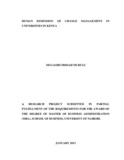| dc.description.abstract | Change management is about managing people in a changing environment so that business changes are successful and the desired business results are realized. Changes in organizations are more and more common. They appear at faster pace and employees are expected to be even more adaptable. Organization support develops trust among employees and facilitates group forming, which increases organizational effectiveness. As organizational support includes resource sharing, reward offering and taking responsibility of employees’ actions, it develops sense of power among employees that they would have the required resources and assistance from the organization. The objective of the study was to determine the human dimension of change management in universities in Kenya. The research design was descriptive research design. The respondents were both public and private universities in Kenya. Data was collected using a questionnaire which consisted of both open and closed ended questions. The data collected was analyzed using descriptive statistics and classified, tabulated and summarized using descriptive measures, percentages and frequency distribution tables and graphs. The study found out that the forces that necessitated change were students’ needs, need for growth, the need for increased effectiveness and performance, need to take advantage of opportunities, technology, to maintain or improve industry position, local competition from other universities, global competition, need for increased independence, leaders’ interest, and the need to reduce dependence on support. Resistance to change was due to lack of enough information, organizational structure, organizational culture, misunderstanding and lack of trust, threat to job status/security, competing commitments, failure to understand the context of change, failure to create a compelling case for change, failure to recognize obstacles, preserve and maintain focus on change, lack of guiding coalition and lack of assessment and measurement system. The study found out that the methods which are used to guide employees through change process and thus reduce resistance was education and communication, participation and involvement, facilitation and support, negotiation and agreement, explicit and implicit coercion, role modeling, counseling, top management support, and timing. | en |


